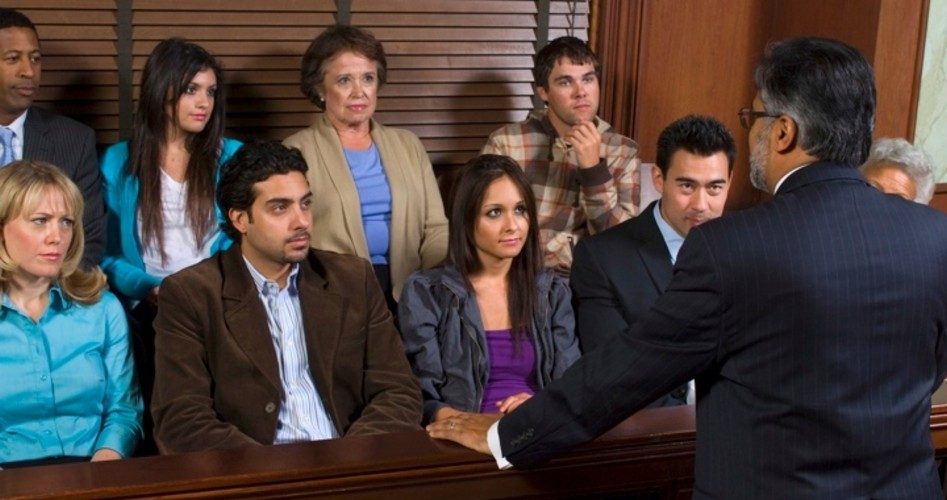
The Alaska State House of Representatives is considering a bill that would would allow jurors in the Last Frontier “not to apply the law to the defendant” in select criminal cases.
House Bill 315 would officially legalize jury nullification of verdicts in cases where jurors believe the “law is unjustly applied to the defendant.”
One paragraph of the bill grants defendants the “right to inform the jury of the jury’s power to judge the just application of the law and to vote on the verdict according to conscience.”
Furthermore, a judge’s failure to allow the defendant to inform the jury of the jury’s power is grounds for a mistrial, according to the language of the bill.
Similar legislation has been offered twice before, in 2002 and 2009. Although it failed to pass out of committee in its two previous iterations, the bill’s primary sponsor hopes for a different outcome this time around. “I think we’re just more independently minded — maybe we do interpretations differently than other areas,” said Rep. Tammie Wilson (R-North Pole).
Wilson called the bill “a check on government that allows the people to judge the laws,” according to a story in the Anchorage Daily News.
That story also adds that Alaska’s Department of Law sees potential problems with the bill, should it be enacted.
“Annie Carpeneti, with the department’s criminal division, told the House Judiciary Committee Wednesday that the bill would create for unfair trials,” the Anchorage Daily News reports.
Additional stumbling blocks for the proposal were set out in the Daily News story:
In a memo dated Feb. 18, Doug Gardner, director of the Legislature’s legal services division, said the bill could run afoul of U.S. Supreme Court decisions going back to the 19th Century. In one case cited by Gardner, the Supreme Court said that “it is the duty of juries in criminal cases to take the law from the court, and apply that law to the facts as they find them to be from the evidence.”
An article in the Fairbanks Daily News-Miner reported that the hearing on the bill by the Alaska House Judiciary Committee lasted “less than seven minutes” before being postponed for consideration at a later date.
Although it is the latest, Alaska is not the first state to consider legislation legalizing jury nullification.
Activists in several states are promoting the practice of jury nullification as a way to prevent the miscarriage of justice by the judiciary and the police.
In 2012, New Hampshire enacted a law protecting the rights of citizens serving on juries to serve as a check on unjust criminal prosecution.
While the subject of nullification occasionally pops up in mainstream media discussions, jury nullification is something that is rarely heard of, even among constitutionalists and supporters of the right of the states to oppose federal overreaching.
Last November, the Washington Times published a story providing a basic introduction to the topic:
Jury nullification occurs when a jury acquits a defendant they believe to be guilty by nullifying one or more laws that they believe should not apply to the defendant. Jurors often exercise nullification when they either personally disagree with a law or feel that the punishment mandated by a law is too harsh. In general, jurors are not reminded by judges of their nullification powers.
Before one is able to understand why jury nullification is a good idea, one must understand the importance of a trial by jury. Our Founding Fathers universally considered it to be a powerful weapon in the war against tyranny.
Thomas Jefferson wrote, “I consider trial by jury as the only anchor yet imagined by man, by which a government can be held to the principles of its constitution.”
In The Federalist Papers, Alexander Hamilton wrote that trial by jury was the “very palladium of free government” and a “valuable check upon corruption.”
Hamilton’s fellow Federalist author and Supreme Court Chief Justice John Jay informed a jury in a 1794 case that:
It may not be amiss, here, Gentlemen, to remind you of the good old rule, that on questions of fact, it is the province of the jury, on questions of law, it is the province of the court to decide. But it must be observed that by the same law, which recognizes this reasonable distribution of jurisdiction, you have nevertheless a right to take upon yourselves to judge of both, and to determine the law as well as the fact in controversy.
Given the strength of these opinions, then, it is no surprise that the denial of trials by jury was one of the foremost acts of despotism listed by Thomas Jefferson in the Declaration of Independence.
As for the concept that juries have not only the power but the obligation to nullify unjust rulings of a judge, John Adams wrote, “It is not only [the juror’s] right, but his duty … to find the verdict according to his own best understanding, judgment, and conscience, though in direct opposition to the direction of the court.”
And Hamilton, again from The Federalist Papers, described the jury’s check on the judge as a “double security” that “tends to preserve the purity” of both judge and jury.
Obviously, the idea that juries may act contrary to the will of a judge is nothing new in American law and in fact it is an act of resistance to government oppression that our Founders believed to be fundamental in a Republic that was to remain free under the rule of law, rather than enslaved according to the rule of men.
As indicated by the statements provided above, our Founding Fathers zealously defended this right and recognized that only an informed and empowered jury could effectively protect a defendant from the potentially harmful effects of autocratic judges.
On its website, the Fully Informed Jury Association, an organization devoted to educating Americans on the benefits of jury nullification, sums up the reason jury nullification is a good idea and one supported by constitutional principles of freedom from tyranny:
The primary function of the independent juror is not, as many think, to dispense punishment to fellow citizens accused of breaking various laws, but rather to protect fellow citizens from tyrannical abuses of power by the government.
Despite all of this, the Washington Times reported in 2013 that jury nullification proponents in Florida and New Jersey “have been arrested and charged with ‘jury tampering’ for distributing handbills at the courthouse that essentially publish the text of the New Hampshire law.”
In an editorial, the Washington Times sees such persecution as a prime example of the need for jury nullification in the fight against government oppression:
This demonstrates clearly the responsibility of juries to serve as a check against judges and prosecutors who may think they’re the last word in all matters of the law. Respect for the law and the courts is necessary for the good of all in a free society, and sometimes, as the number of frivolous and oppressive laws multiply, a little nullification can be a tonic, and a reminder to the lawyers, including judges, of who’s really the boss.
Naysayers notwithstanding, the Constitution guarantees the right to trial by jury. This means that the government must bring its case before a jury of the people if government wants to deprive any person of life, liberty, or property. In defense of those “unalienable rights,” indeed, as the last line of defense, jurors can reject government tyranny by refusing to convict those subjected to prosecution for violating unjust laws.
As of the time of writing this article, the issue has not been reintroduced to the Alaska House Judiciary Committee. If enacted, however, the bill would take immediate effect.
Joe A. Wolverton, II, J.D. is a correspondent for The New American and travels nationwide speaking on nullification, the Second Amendment, the surveillance state, and other constitutional issues. Follow him on Twitter @TNAJoeWolverton and he can be reached at [email protected].



